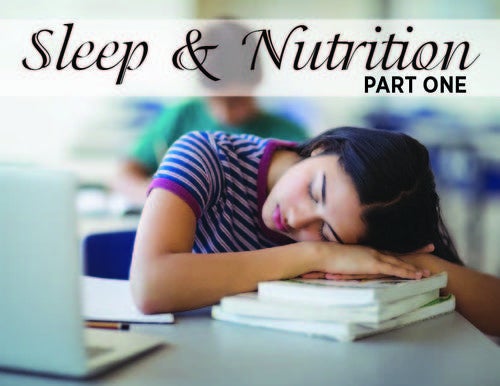
This is the first of a 2 part blog series on Nutrition and Sleep. This first post, will talk about how sleep impacts our bodies from a nutrition perspective.
Sleep affects nutrition, and overall health and wellness more than we think it does, or at least more than we give it credit for. A good night’s rest can impact our mood, hunger and fullness hormones and overall motivation towards health supporting behaviours. Keep reading to learn about how sleep can affect sleep affects how we digest, our energy level, and our food cravings.
1. Appetite & Metabolism
When we sleep, our body processes important hormones that help regulate appetite (hunger and fullness) and metabolism (energy use). These hormones include Ghrelin, which triggers hunger, and Leptin, which signals satiety. When we don’t get enough sleep, our body makes more Ghrelin, and less Leptin. The end result? A lack of sleep can increase appetite, and reduce our ability to recognize fullness cues.
What can you do? Be patient with yourself, and make time to sit down at a table for meals. If you’re running low on sleep, make an effort to pay a little extra attention to your hunger and fullness cues throughout the day.
2. Finding the Energy
When we’re tired, our bodies are searching for quick jolt – think lattes and cookies. We crave calorie-dense foods like fats and refined carbohydrates (sugar) because these foods provide a ‘quick energy fix’. While these foods may provide an immediate burst of energy, it is often followed by a steep blood sugar decline, and increased fatigue in the long run.
What can you do? On days when you don’t get enough rest, reach for nutrient dense options that provide lasting energy such as whole grains, legumes, fruits, vegetables and lean protein. The fibre, micronutrients, and protein in these foods will help stabilize blood sugar, and keep you energized. Make water or herbal tea your beverage of choice instead of relying on caffeinated beverages which can often lead to more fatigue, dehydration and headaches later in the day.
3. Self Care & Cravings
It’s no surprise that a lack of sleep can make decisions more challenging, and increase irritability or stress. Getting enough rest helps keep our cognitive, emotional reasoning and decision making skills sharp. So it makes sense that a fuzzy cognitive and emotional state can influence our food cravings throughout the day. We may be in the mood for more snacks, lack motivation to cook a meal, and experience increase emotional food cravings.
What can you do? Portion out snacks and choose nutrient dense options like vegetables with hummus, or apple slices with nut butter. If you don’t have the energy to cook, try making a simple meal like a veggie omelette and whole grain toast for dinner, or choose a nutritious option like a salad with lean protein or wrap from a local grocery store or restaurant (swap the caffeinated soda for a carton of milk or sparkling water). If you start to feel the stress creeping up and cravings setting in, take a moment for self care. Pause and ask yourself “what am I feeling and what do I need?” A nap, a bath, some ‘me-time’, my favourite movie, a walk outside? Sometimes it might be a bowl of popcorn. There is no right answer, but the key thing is to get present and check-in with what your body needs.
Stay tuned for Part 2 where we will talk about how to eat for better sleep!
Sources:
- Why Dietitians Care about your Sleep, https://www.jasper-nutrition.com/blog/2017/7/14/why-dietitians-care-about-your-sleep
- The Link Between Sleep and Weight Gain — Research Shows Poor Sleep Quality Raises Obesity and Chronic Disease Risk, Nancy L. Kondracki, MS, RD, LDN
- Sleep Well: What to Eat for Better Sleep, Ana Mantica
- The Link Between Sleep and Weight Gain — Research Shows Poor Sleep Quality Raises Obesity and Chronic Disease Risk, Nancy L. Kondracki, MS, RD, LDN





